Do you have annoying bad habits like biting nails, burping, being messy, or fidgeting? Want to get rid of them but are unable to? Feeling guilty of your bad habits? What if bad habits are not that bad for you?
This post covers some of the common bad habits and how they benefit you when carried out in moderation. (You can’t see the benefits when you are addicted to bad habits).
13 Bad Habits That Are Actually Good For You (Says Science)
1. Fidgeting Burns Calories
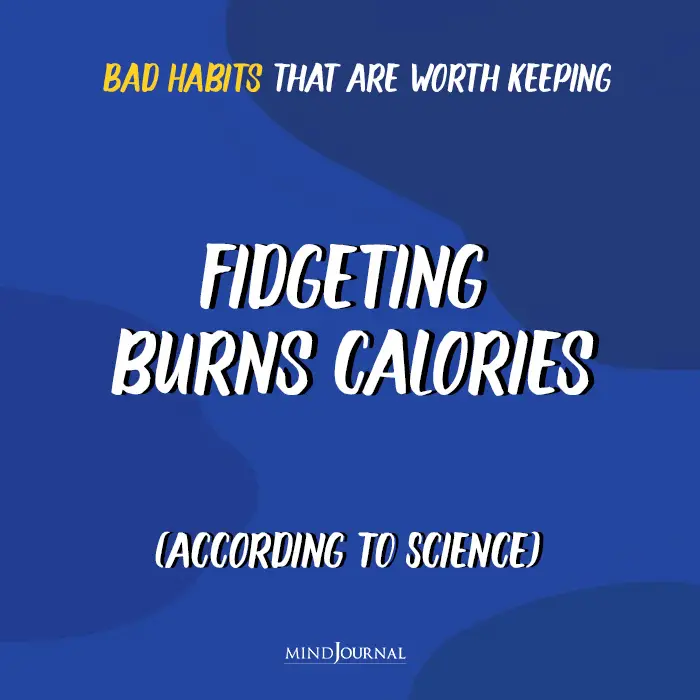
Do you struggle to quietly sit in one place? Can’t stop tapping your foot, doodling, or twiddling your thumb? Then I have good news for you.
Fidgeting burns calories! It is one of the non-exercise thermogenesis (NEAT) activities like walking or gardening. According to obesity expert James Levine at the Mayo Clinic, fidgeting speeds up metabolism by stimulating neurochemicals in the body. This process leads to the fast conversion of fat into energy, burning up about 350 kcal a day.
According to a study at the University of Missouri tapping your toes while sitting can protect the arteries in the legs, and potentially prevent arterial disease. Being moderately or very fidgety prevents negative health impacts of sitting for long hours, showed the study published in the American Journal of Preventive Medicine.
With so many health benefits, fidgeting shouldn’t be on the list of bad habits. Agree?
Related: The Amazing Benefits Of Fasting On Our Body According to Science
2. Playing Video Games Kill The Pain
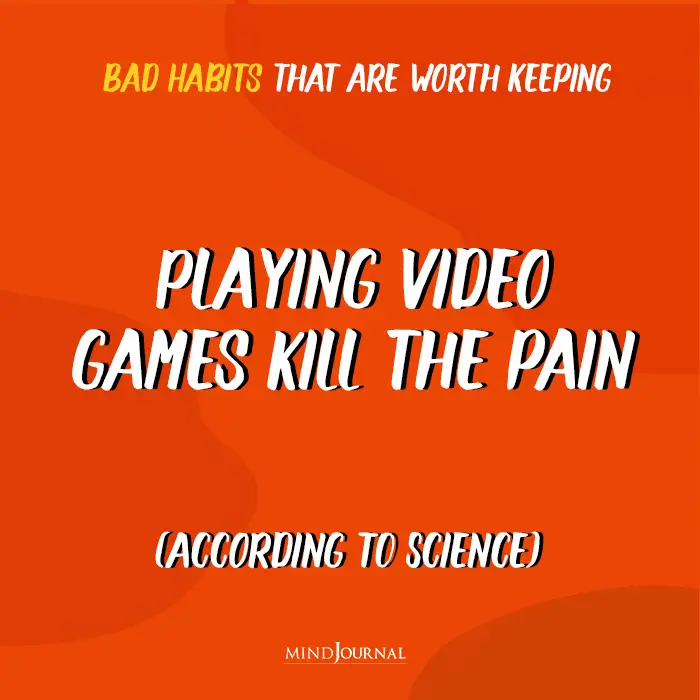
Playing video games is one of the sedentary and bad habits because it’s not physically demanding. But, scientific evidence showed that children with cancer who play video games after chemotherapy require less pain-killing medication. Playing video games work as pain-relieving therapy for patients with back pain and burns.
Psychologists refer to it as a “cognitive distractor task” because it consumes all of our cognitive mind space. Because these games are engaging and easily distract our minds from anything else. Playing video games can be considered as one of the good habits because it also improves hand-eye coordination and reaction times, and offers educational learning benefits. What do you think?
3. Daydreaming Helps In Solving Problems
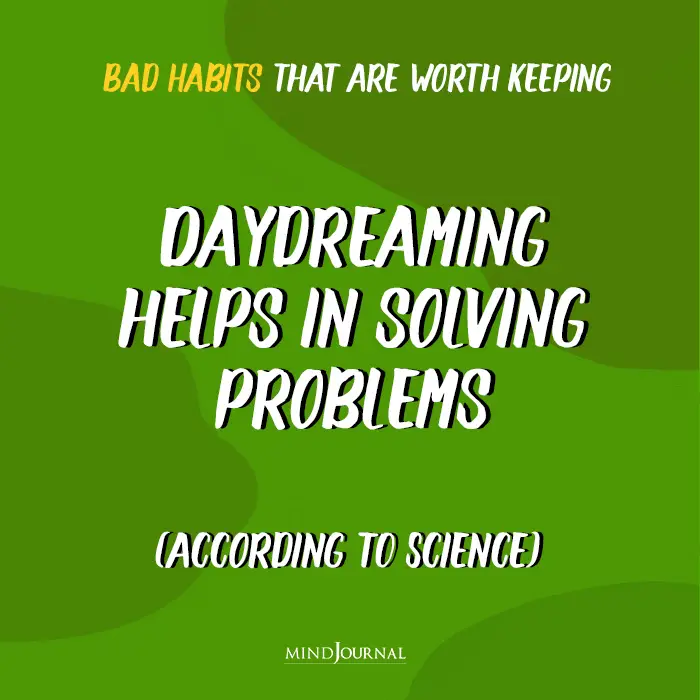
While daydreaming is always considered a bad habit, a brain scan study from Georgia Institute of Technology found that daydreamers are highly intelligent, creative, and better problem-solvers. Those with efficient brains reported frequent daydreaming. More the brain efficiency, more the capacity to think, so the mind can easily wander when performing easy tasks.
Daydreaming is good because it activates the “executive network” in our brain and areas associated with complex problem-solving. In this state, you can think beyond your immediate goals like reading a book and address important concerns like how to advance a career.
4. Chewing Gum Increases Thinking Power
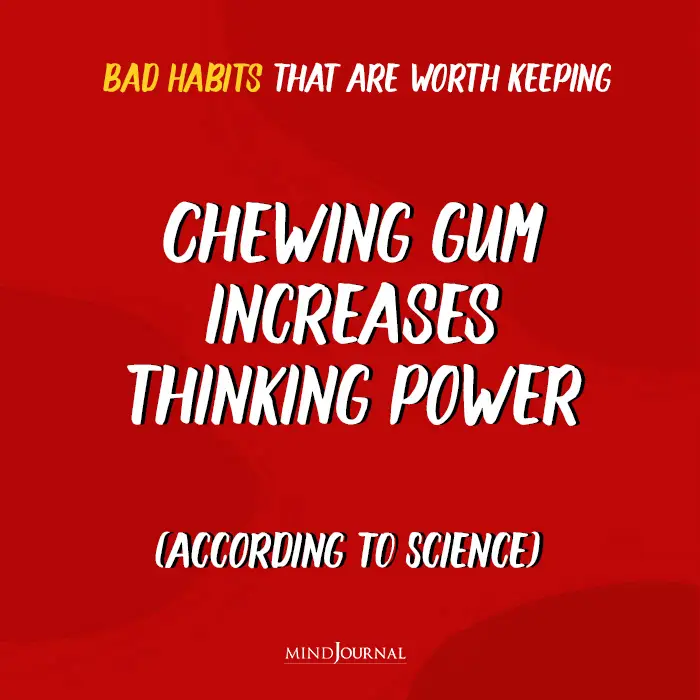
Chewing gum in school or at home irritates our elders. Nothing can stop them from scolding us even though this habit isn’t linked to health risks. You will be glad to know that chewing gum reduces stress and improves thinking power. Researchers from Cardiff University found that chewing gum lowered stress and improved alertness in workers. Reaction times among chewers were 10% faster than for non-chewers.
Another study revealed that chewing gum selectively improves short-term and long-term memory in healthy volunteers. That could be the reason why athletes chew gum during games. As mentioned in the book Senescence and Senescence-Related Disorders, chewing gum immediately before performing a cognitive task increases blood oxygen levels in the parts of the brain involved in learning and memory—thereby improving task performance.
5. Picking Nose And Biting Nails Strengthens Immunity
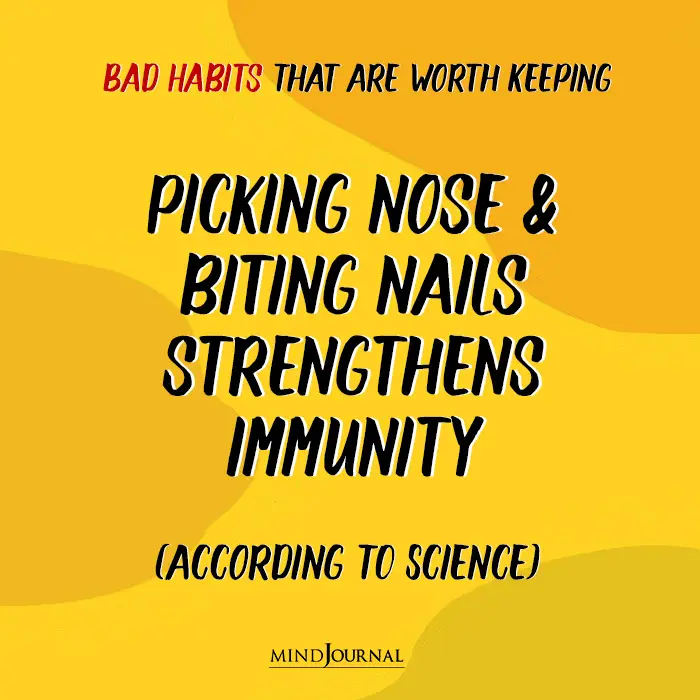
Eating snot is one of the most disgusting, bad habits. Every time you see someone picking a nose you wanna puke. Don’t you?
To my surprise, researchers proved that it’s not a very bad habit. Austrian lung specialist, claims that picking nose makes you healthier and happier. Eating boogers strengthens the immune system. Boogers contain bacteria and other microorganisms which when they pass through the intestines boost our immune system. Boogers work like medicine.
Our immune system has a memory, it remembers how to fight every bug it has ever encountered. When the same bug is encountered a second time, the immune system reaches into its memory and releases weapons — called memory lymphocytes — that it knows will beat it.
Ahem!!! I think as long as you pick your nose privately, it won’t be an issue.
We get the same benefit from biting nails according to Dr. Hilary Longhurst, consultant immunologist from the Bart’s NHS Trust!
6. Swearing Relieves Pain
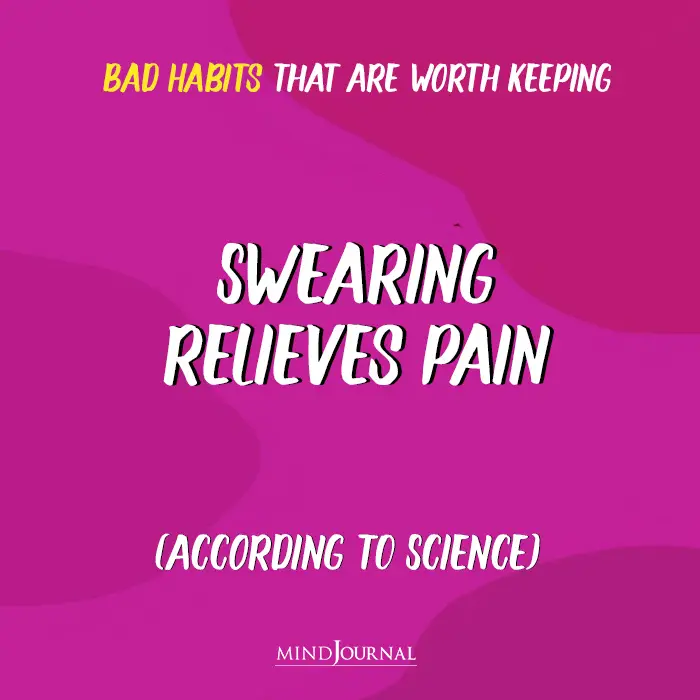
You must have heard people saying “swearing is like yoga”? Well, they may be right! Using swear words relieves pain and stress. Yes, you read it right! In one study, researchers asked participants to immerse their hands in icy water, while repeating a swear word. The participants were asked to repeat the same test without swearing. The aim was to examine if swearing affects cold-pressor pain tolerance, pain perception, and heart rate.
The study findings revealed that swearing helped people withstand the pain for longer compared with not swearing. The participants also showed a greater increase in heart rate and decreased perceived pain. Researchers said that fight-or-flight response may be induced by swearing as a result the link between fear of pain and pain perception is nullified. However, swearing as a casual habit may alleviate pain, but not when you overuse it, researchers say!
Another study showed that people who swear often are more honest and have more integrity. Research published in the Leadership and Organization Development Journal highlighted that regular swearing expressed and reinforced solidarity among staff members. Swearing helped them better to express feelings such as frustration and develop social relationships.
Even though the old school says, swearing isn’t really that bad!
Related: Science Says People Who Swear More Have Superior Intelligence
7. Being Messy Boosts Creativity
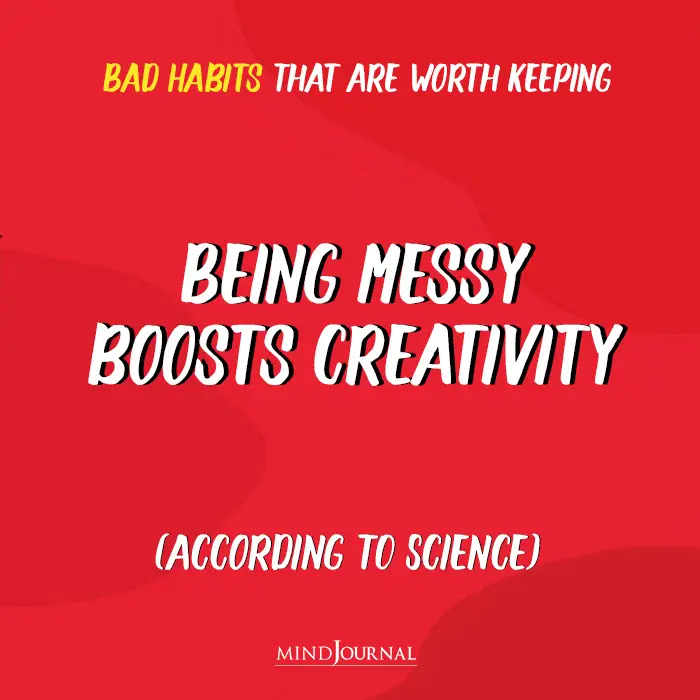
Old etiquette rules might deem being messy reckless or irresponsible, but is it really a bad habit? A messy bedroom or workstation encourages creative thinking. It influences your mind and makes you open to new ideas according to researchers from the University of Minnesota Carlson School of Management. On the other hand, a clean environment has its own benefits but is too conventional to let inspiration flow.
The research team in an experiment asked 48 participants living in either a messy room or a tidy room to think about different uses for ping pong balls and to write them down. The participants’ answers were rated based on the degree of creativity. As per results, volunteers in both messy and tidy rooms listed the same number of ideas, but people in messy rooms generated 28% more creative ideas and were 5 times more likely to produce “highly creative” ideas.
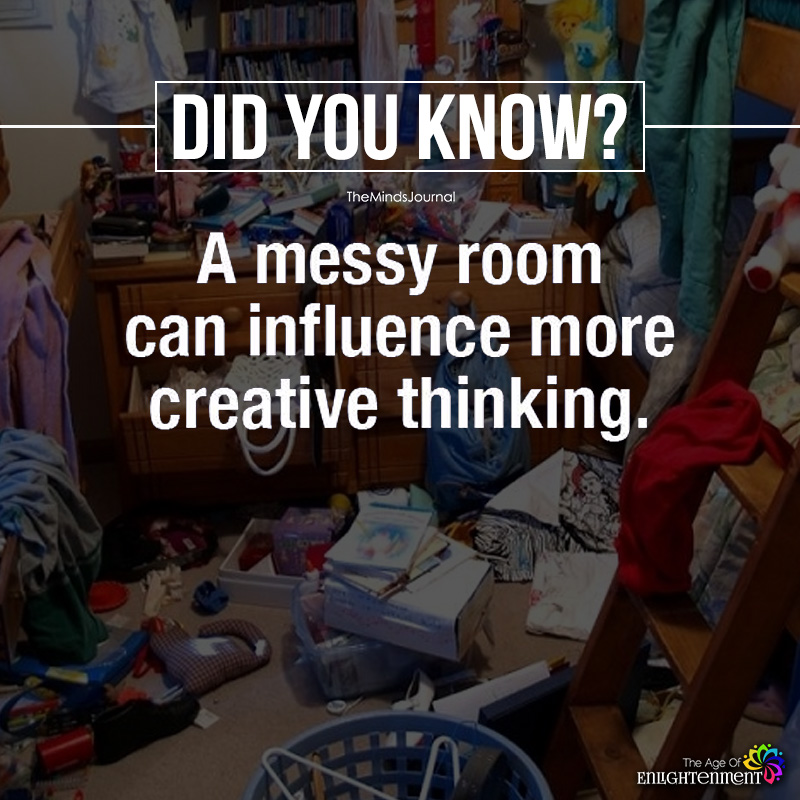
8. Getting Enough Sleep Reduces Heart Attacks
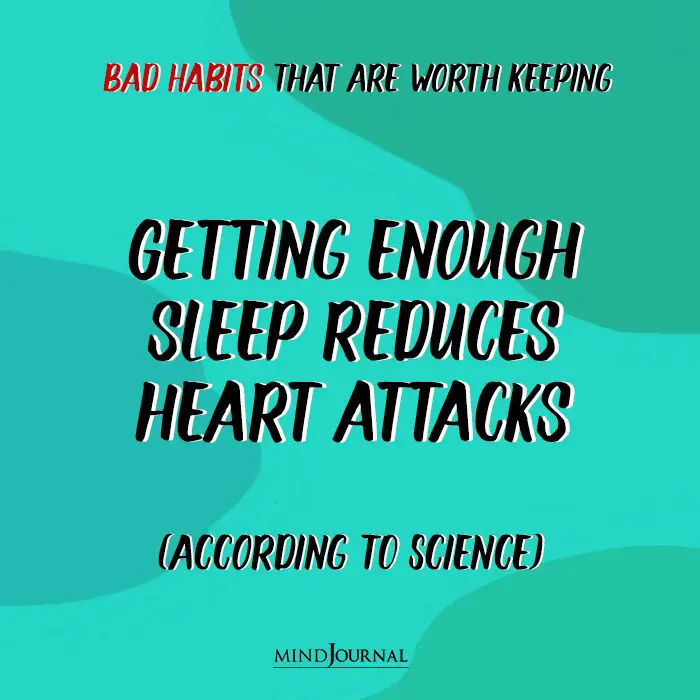
It is the common belief that people in the 5 am club enjoy good health. But, the latest research by Mayuko Kadono of the Kyoto Prefectural University of Medicine, proves it wrong. In one study, individuals getting up before 5 a.m. for exercising were found to have – 1.7 times greater risk of high blood pressure and were twice as likely to develop cardiovascular disease – when compared to those who got up two-to-three hours later.
Waking up as soon as your alarm starts ringing, is not a good idea. Because it may lead to several health consequences. Most restorative sleep occurs between 2:00 a.m. and 6:30 a.m, according to scientists at Stanford. As per recent sleep research, it is better to wake up in the morning when your body feels ready, which means in alignment with your body’s natural circadian rhythm.
Then what about naps? Well, in a study from the American College of Cardiology, those who took naps experienced a dip in blood pressure, when compared to those who skipped their afternoon snooze. So, daytime naps are not bad habits and are not actually a waste of your daylight hours. Naps can improve mood, productivity, and stress levels.
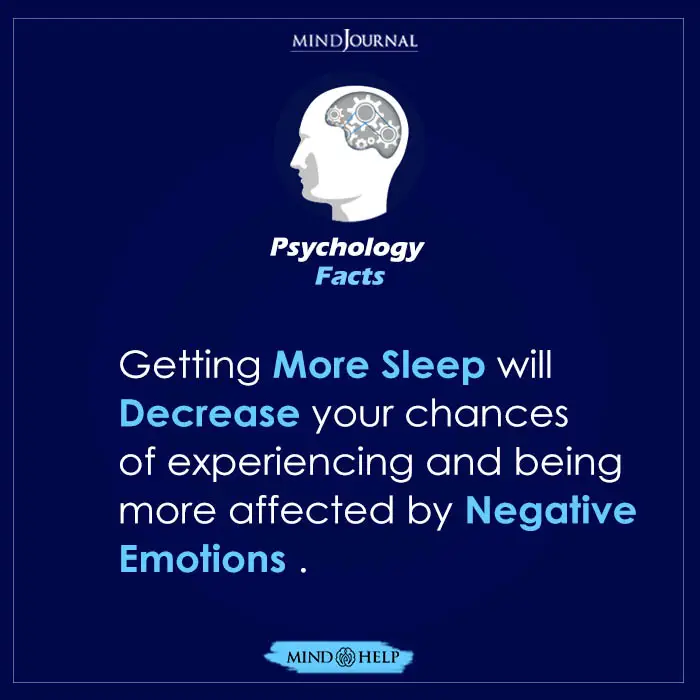
9. Snacking Helps You Manage Hunger
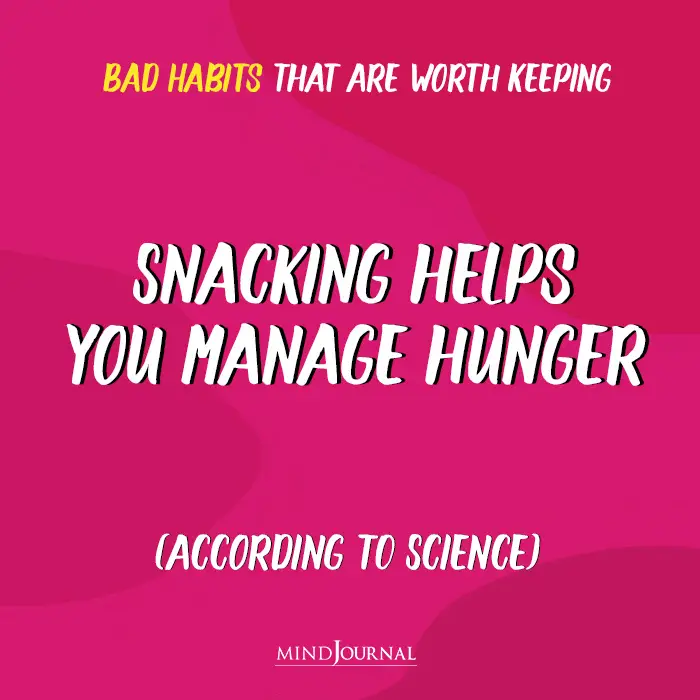
Most people believe snacking is one of those bad habits that lead to overeating and obesity. But, that is so not true said registered dietitian Meg Salvia, to The Active Times. According to her, snacking between meals helps in managing hunger. It prevents hunger from getting too unmanageable.
However, one must make sure to eat snacks along with other food groups – like protein and/or fat with a carbohydrate such as a grain – so that what you eat is nutritious as well as satisfying.
Related: The Food Craving Guide: What You Crave For and What Your Body Actually Needs
10. Gossiping Helps Friendships
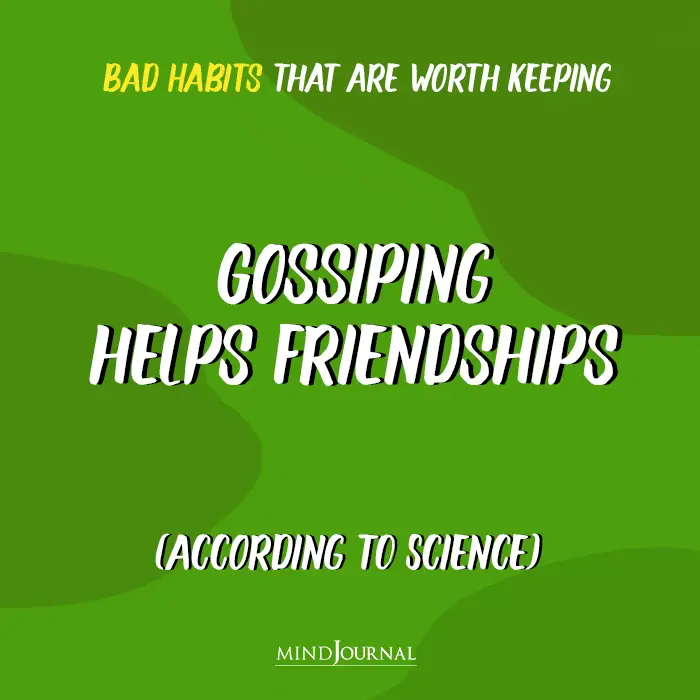
This is one of those bad habits that are so, so good for you. Gossiping is the best stress-buster for many people across the world. Seeking pleasure from gossiping with friends and neighbors is linked to increasing in oxytocin – a cuddle or love or bonding hormone.
When released by the brain in an adequate amount, oxytocin facilitates prosocial behavior, social interaction and helps in developing attachments and friendships and learn about cultural norms. When oxytocin is present in a high amount, people tend to have high spirits and a good mood. Thus, gossiping releases oxytocin and makes us feel a sense of trust and satisfaction bringing us closer to other people. This so-called bad habit makes us feel good about our lives, relieves stress, anxiety, and tension.
Evolutionary psychologist Robin Dunbar of Oxford said, “Gossip is what makes human society as we know it possible.” In addition, a study published in the journal Psychological Bulletin highlighted that people who complain actually have higher self-esteem than those who bottle things up.
11. Tanning Improves Mood
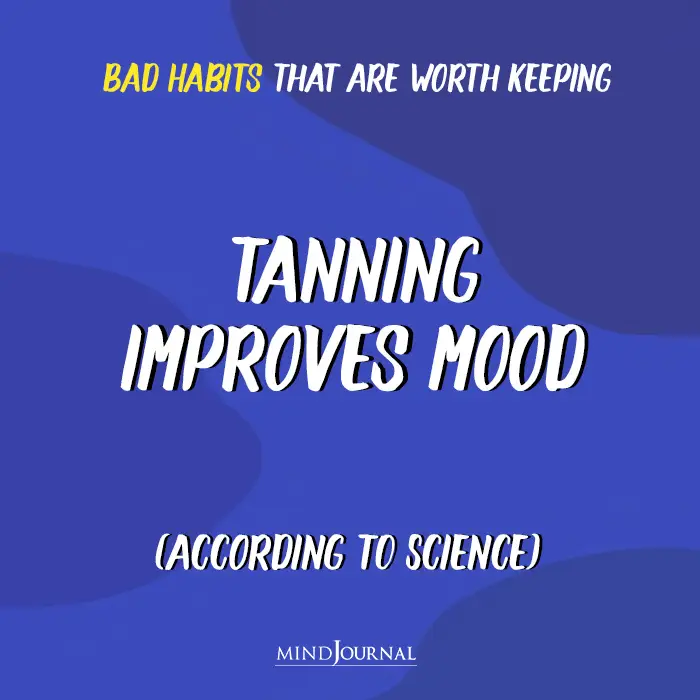
Suntan has a bad rap because too much exposure to UV rays can cause skin cancer. Just like tanning beds are harmful to health, avoiding sunscreen is equally bad. According to skincare experts, you must apply sunscreen every day. Basking in the sun with proper UV protection has health benefits. Yes, you read it right!
According to one study participants who increased exposure to sunlight showed significant improvement in mood after one week. Sitting in sun helps produce Vitamin D that is essential for healthy cells in our body. This vitamin is crucial for regulating mood, strengthening bones and the immune system. That said, make sure not to get a sunburn, while you spend quality time outside!
12. Burping And Farting Help Relieve Bloating
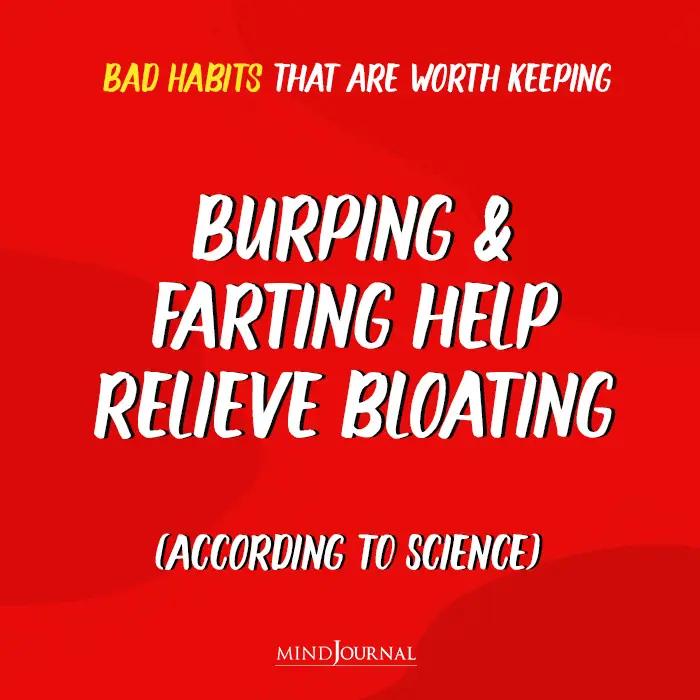
Although important for digestion and good gastric health, burping and farting are popular bad habits for ages. According to Nick Read, a British gastroenterologist, not burping will keep the gas on the stomach, which can relax the valve that separates the gullet and the stomach, allowing stomach acid to splash up into the gullet, triggering heartburn. Similarly, farting helps get rid of wind formed in the bowel, and holding it causes pain.
People in public transport are embarrassed to break wind, as a result, suffer from pain and bloating which is called Metropolitan Railway Syndrome. So, it is better out than in.
13. Saying No Ensures Mental Peace
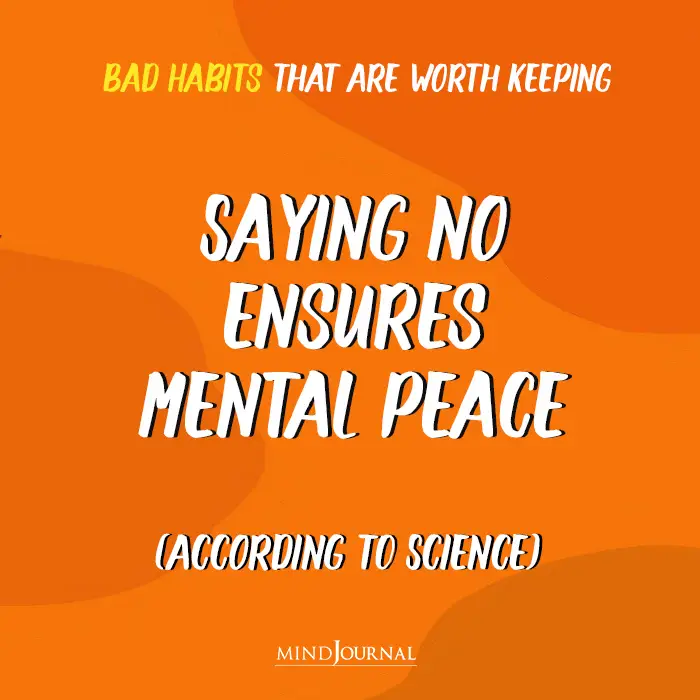
Saying yes makes you appear polite and impressive on the outside. But in the quest to always please people and come across as prosocial, you will lose your mental peace. You need alone time to recharge your mind and reflect on your daily life and address your worries. Else, it will ruin your mental and physical health. So, saying “NO” should not be considered a bad habit.
Sometimes putting yourself first doesn’t make you selfish. Knowing when to prioritize your needs and yourself is a strong aspect of character and makes you a kinder person. A study from Stanford showed that those who act in their own self-interest are more likely to be recognized for their achievements and attain leadership positions.
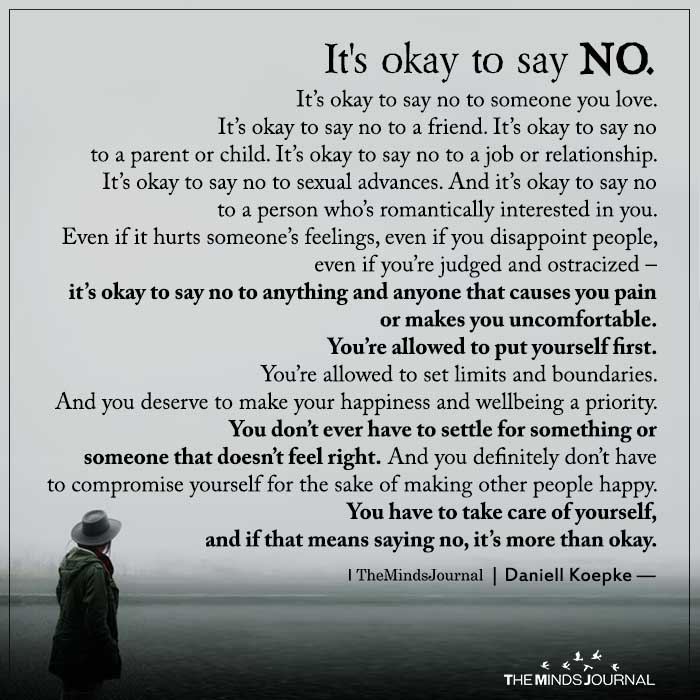
Happy to know the upside of your bad habits? Leave a comment below.
Please remember that too much of anything is not good. The more you engage in these bad habits in lure of short term benefits, the more devastating will be the long-term cost.
If you find this post valuable and helpful please share it with your friends.

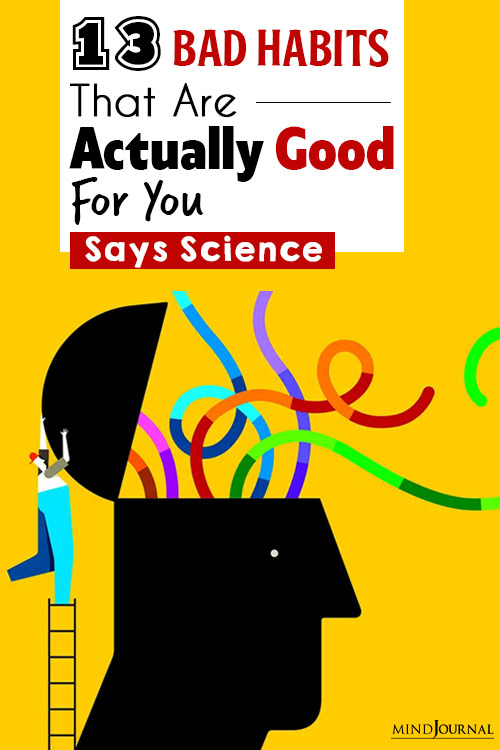
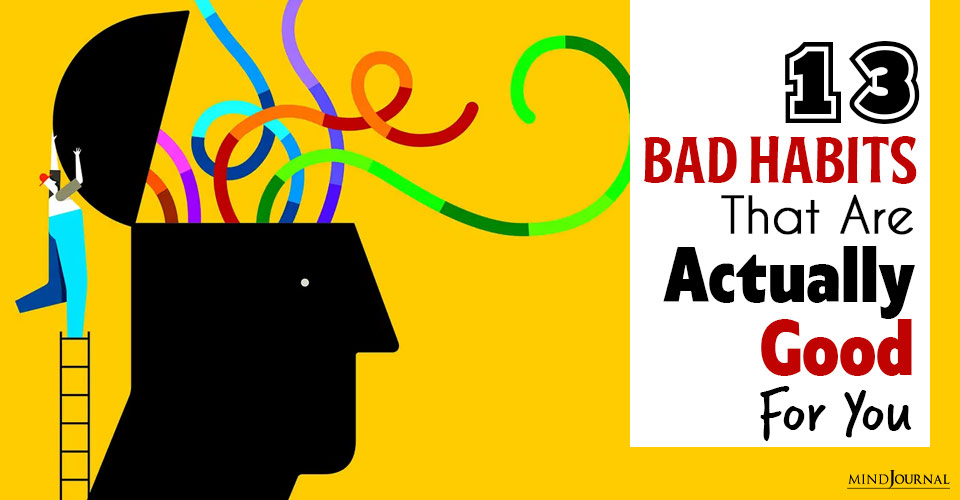




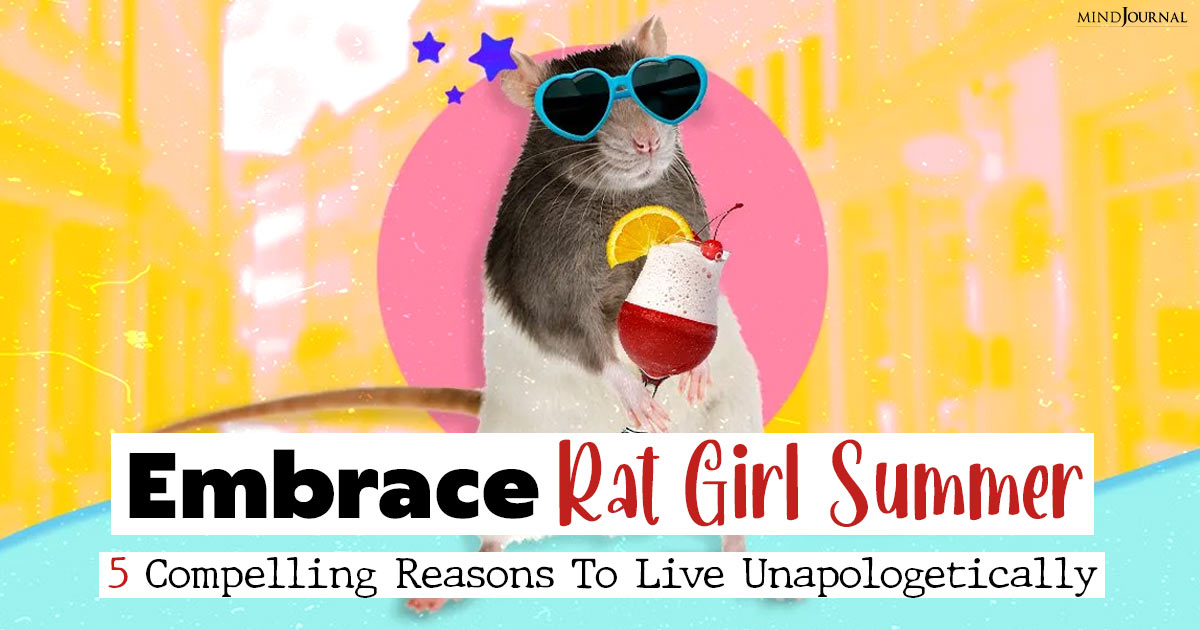


Leave a Reply
You must be logged in to post a comment.